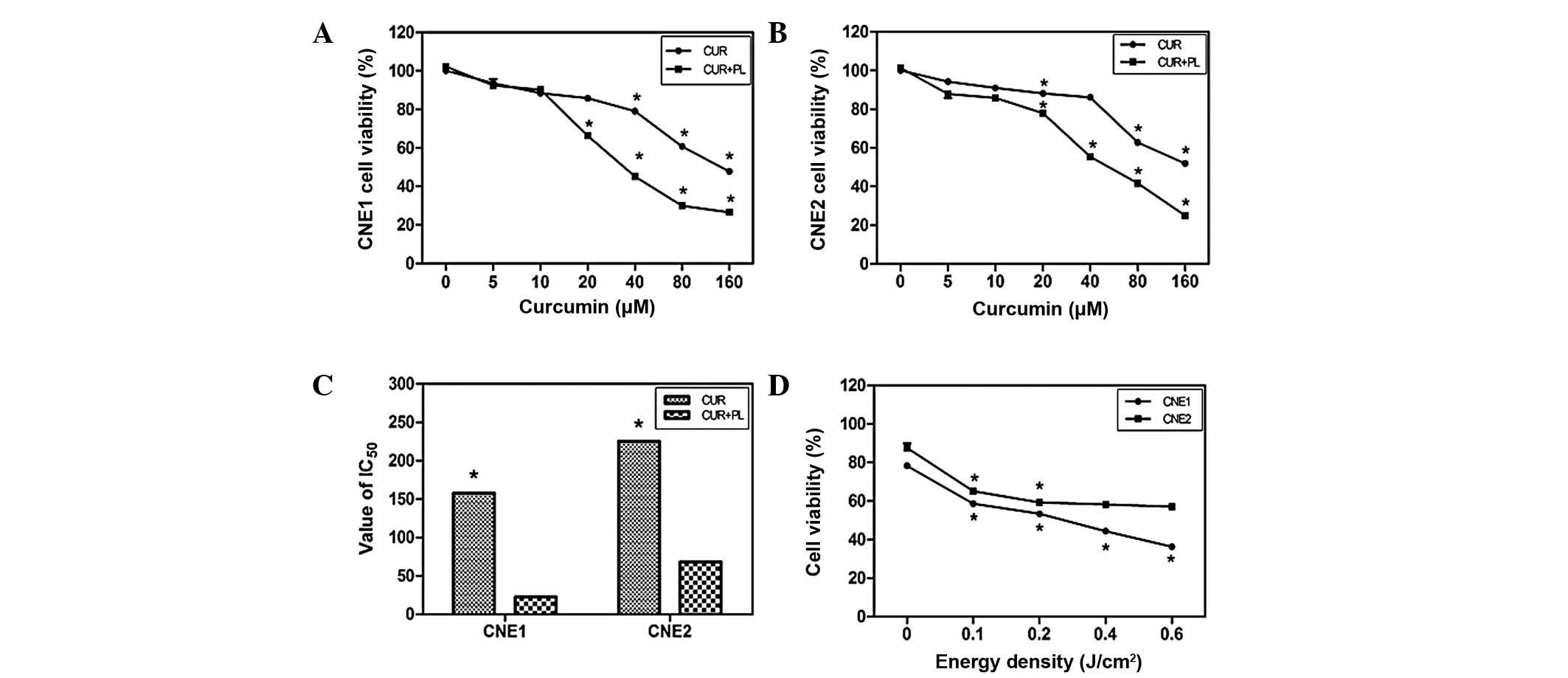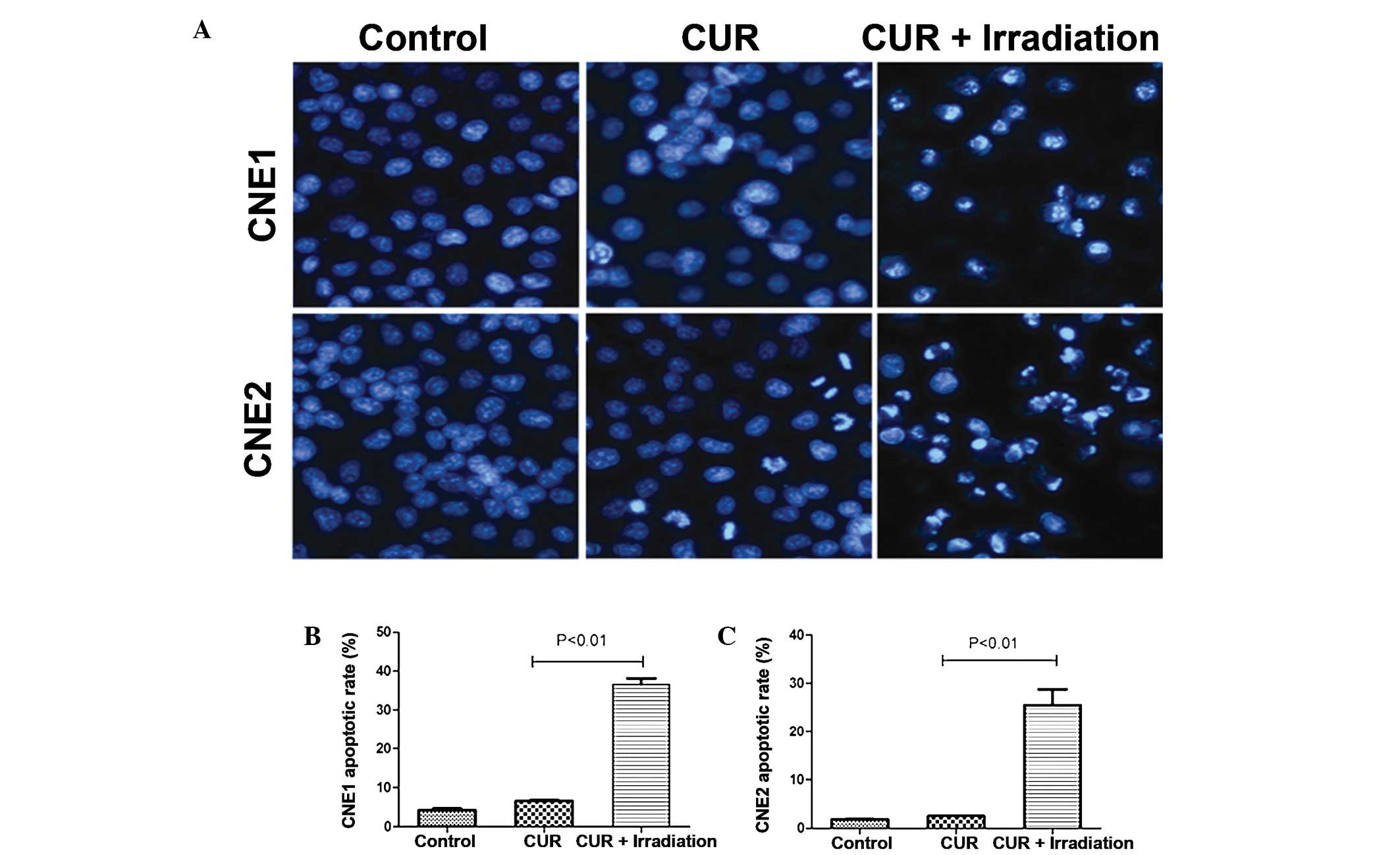|
1.
|
Her C: Nasopharyngeal cancer and the
Southeast Asian patient. Am Fam Physician. 63:1776–1782.
2001.PubMed/NCBI
|
|
2.
|
Lee AW, Poon YF, Foo W, et al:
Retrospective analysis of 5037 patients with nasopharyngeal
carcinoma treated during 1976–1985: overall survival and patterns
of failure. Int J Radiat Oncol Biol Phys. 23:261–270.
1992.PubMed/NCBI
|
|
3.
|
Ahmad A and Stefani S: Distant metastases
of nasopharyngeal carcinoma: a study of 256 male patients. J Surg
Oncol. 33:194–197. 1986. View Article : Google Scholar : PubMed/NCBI
|
|
4.
|
Harvey AL: Natural products in drug
discovery. Drug Discov Today. 13:894–901. 2008. View Article : Google Scholar : PubMed/NCBI
|
|
5.
|
Kunnumakkara AB, Anand P and Aggarwal BB:
Curcumin inhibits proliferation, invasion, angiogenesis and
metastasis of different cancers through interaction with multiple
cell signaling proteins. Cancer Lett. 269:199–225. 2008. View Article : Google Scholar
|
|
6.
|
Kunwar A, Barik A, Mishra B, Rathinasamy
K, Pandey R and Priyadarsini KI: Quantitative cellular uptake,
localization and cytotoxicity of curcumin in normal and tumor
cells. Biochim Biophys Acta. 1780:673–679. 2008. View Article : Google Scholar : PubMed/NCBI
|
|
7.
|
Cheng AL, Hsu CH, Lin JK, et al: Phase I
clinical trial of curcumin, a chemopreventive agent, in patients
with high-risk or pre-malignant lesions. Anticancer Res.
21:2895–2900. 2001.PubMed/NCBI
|
|
8.
|
Goel A, Kunnumakkara AB and Aggarwal BB:
Curcumin as ‘Curecumin’: from kitchen to clinic. Biochem Pharmacol.
75:787–809. 2008.
|
|
9.
|
Dahl TA, Bilski P, Reszka KJ and Chignell
CF: Photocytotoxicity of curcumin. Photochem Photobiol. 59:290–294.
1994. View Article : Google Scholar
|
|
10.
|
López-Jornet P, Camacho-Alonso F and
Gómez-Garcia F: Effect of curcumin and irradiation in PE/CA-PJ15
oral squamous cell carcinoma. Acta Odontol Scand. 69:269–273.
2011.PubMed/NCBI
|
|
11.
|
Koon H, Leung AW, Yue KK and Mak NK:
Photodynamic effect of curcumin on NPC/CNE2 cells. J Environ Pathol
Toxicol Oncol. 25:205–215. 2006. View Article : Google Scholar : PubMed/NCBI
|
|
12.
|
Park K and Lee JH: Photosensitizer effect
of curcumin on UVB-irradiated HaCaT cells through activation of
caspase pathways. Oncol Rep. 17:537–540. 2007.PubMed/NCBI
|
|
13.
|
Jain V, Prasad V, Pal R and Singh S:
Standardization and stability studies of neuroprotective lipid
soluble fraction obtained from Curcuma longa. J Pharm Biomed
Anal. 44:1079–1086. 2007. View Article : Google Scholar : PubMed/NCBI
|
|
14.
|
Nardo L, Andreoni A, Bondani M, Másson M
and Hjorth Tønnesen H: Studies on curcumin and curcuminoids. XXXIV.
Photophysical properties of a symmetrical, non-substituted curcumin
analogue. J Photochem Photobiol B. 97:77–86. 2009. View Article : Google Scholar : PubMed/NCBI
|
|
15.
|
López-Lázaro M: Anticancer and
carcinogenic properties of curcumin: considerations for its
clinical development as a cancer chemopreventive and
chemotherapeutic agent. Mol Nutr Food Res. 52(Suppl 1): S103–S127.
2008.PubMed/NCBI
|
|
16.
|
Yang FW, Huang JZ, Lin XL, Zhen ZN and
Chen XM: Apoptosis in nasopharyngeal carcinoma cell line NCE
induced by curcumin and its molecular mechanism. Zhonghua Er Bi Yan
Hou Tou Jing Wai Ke Za Zhi. 41:612–616. 2006.(In Chinese).
|
|
17.
|
Lin YT, Wang LF and Hsu YC: Curcuminoids
suppress the growth of pharynx and nasopharyngeal carcinoma cells
through induced apoptosis. J Agric Food Chem. 57:3765–3770. 2009.
View Article : Google Scholar : PubMed/NCBI
|
|
18.
|
Zheng XK, Chen LH, Wang WJ, Ye F, Liu JB,
Li QS and Sun HW: Impact of prolonged fraction delivery times
simulating IMRT on cultured nasopharyngeal carcinoma cell killing.
Int J Radiat Oncol Biol Phys. 78:1541–1547. 2010. View Article : Google Scholar : PubMed/NCBI
|
|
19.
|
Chignell CF, Bilski P, Reszka KJ, Motten
AG, Sik RH and Dahl TA: Spectral and photochemical properties of
curcumin. Photochem Photobiol. 59:295–302. 1994. View Article : Google Scholar : PubMed/NCBI
|
|
20.
|
Atsumi T, Tonosaki K and Fujisawa S:
Comparative cytotoxicity and ROS generation by curcumin and
tetrahydrocurcumin following visible-light irradiation or treatment
with horseradish peroxidase. Anticancer Res. 27:363–371.
2007.PubMed/NCBI
|
|
21.
|
Khurana A and Ho CT: High performance
liquid chromatography analysis of curcuminoids and their
photo-oxidative decomposition compounds in Curcuma longa L.
J Liq Chromatogr. 11:2295–2304. 1988. View Article : Google Scholar
|
|
22.
|
Dujic J, Kippenberger S, Ramirez-Bosca A,
et al: Curcumin in combination with visible light inhibits tumor
growth in a xenograft tumor model. Int J Cancer. 124:1422–1428.
2009. View Article : Google Scholar : PubMed/NCBI
|
|
23.
|
Chan WH and Wu HJ: Anti-apoptotic effects
of curcumin on photosensitized human epidermal carcinoma A431
cells. J Cell Biochem. 92:200–212. 2004. View Article : Google Scholar : PubMed/NCBI
|
|
24.
|
Thayyullathil F, Chathoth S, Hago A, Patel
M and Galadari S: Rapid reactive oxygen species (ROS) generation
induced by curcumin leads to caspase-dependent and -independent
apoptosis in L929 cells. Free Radic Biol Med. 45:1403–1412. 2008.
View Article : Google Scholar : PubMed/NCBI
|
|
25.
|
Diehl JA: Cycling to cancer with cyclin
D1. Cancer Biol Ther. 1:226–231. 2002. View
Article : Google Scholar : PubMed/NCBI
|
|
26.
|
Mehta K, Pantazis P, McQueen T and
Aggarwal BB: Antiproliferative effect of curcumin
(diferuloylmethane) against human breast tumor cell lines.
Anticancer Drugs. 8:470–481. 1997. View Article : Google Scholar : PubMed/NCBI
|


















